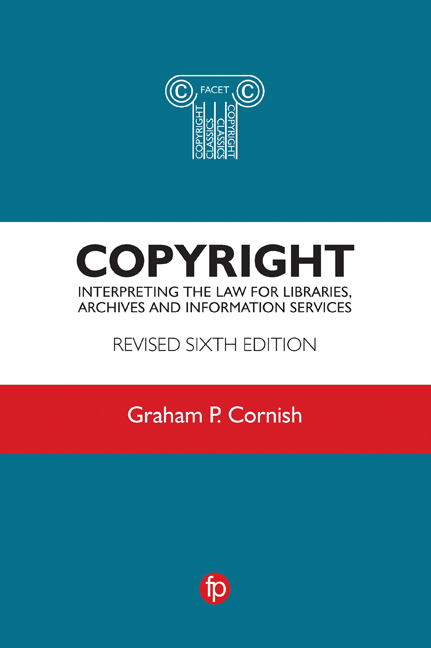Book contents
- Frontmatter
- Contents
- Author's note
- Acknowledgements
- List of abbreviations
- Introduction
- Section 1 Definition and law
- Section 2 What is covered by copyright?
- Section 3 Rights and limitations
- Section 4 Literary, dramatic and musical works
- Section 5 Artistic works
- Section 6 Sound recordings and performers’ rights
- Section 7 Films and videos
- Section 8 Broadcasts
- Section 9 Databases
- Section 10 Licensing schemes and licences
- Section 11 Computer programs, the electronic world and websites
- Section 12 Other matters
- Useful Addresses and Contacts
- Useful Sources of Information
- Appendix: suggested declaration forms
- Index
Section 4 - Literary, dramatic and musical works
Published online by Cambridge University Press: 19 November 2019
- Frontmatter
- Contents
- Author's note
- Acknowledgements
- List of abbreviations
- Introduction
- Section 1 Definition and law
- Section 2 What is covered by copyright?
- Section 3 Rights and limitations
- Section 4 Literary, dramatic and musical works
- Section 5 Artistic works
- Section 6 Sound recordings and performers’ rights
- Section 7 Films and videos
- Section 8 Broadcasts
- Section 9 Databases
- Section 10 Licensing schemes and licences
- Section 11 Computer programs, the electronic world and websites
- Section 12 Other matters
- Useful Addresses and Contacts
- Useful Sources of Information
- Appendix: suggested declaration forms
- Index
Summary
Why are these three grouped together?
Because they are all treated in a similar way under the Copyright Act, although there are some differences for some specific areas. In addition, a printed and published text also has a copyright in the typographical arrangement of the work concerned, regardless of the copyright status of the content. Any literary work that also qualifies as a database is subject to special rules. See Section 9 for details.
Definitions
Literary works
What is a literary work?
The term ‘literary work’ includes anything made up of words or characters that are written in any form, such as books, journals, technical reports and manuscripts, and covers any works that are spoken or sung provided they are recorded in some way. It also includes compilations (where these do not qualify as databases – see Section 9) as well as computer programs and text stored electronically. The handwritten notes of an author are protected just as much as the final printed book.
Does ‘literary’ mean it has to be good-quality literature?
No. Copyright law says almost nothing about the quality or content of the work, although case law shows that trivial works are not eligible for protection. Literary means anything that is written, spoken or sung which has been recorded, whether in writing or some other notation or code. This is why a computer program is considered a literary work in legal terms. It also includes items such as knitting patterns.
What about books or articles written in scripts like Japanese, Chinese or Arabic, which many people in cultures using the Latin alphabet cannot read?
This makes no difference. They meet the criteria of being written in a notation or code. Just because some people cannot read them it does not mean others cannot! People whose language is recorded in scripts other than the Latin alphabet will have the same view.
What about databases? Are these covered by copyright?
They may sometimes be covered by copyright but they are definitely covered by database right as a separate type of work. See Section 9 for details.
Are bibliographic records covered by copyright?
This is a difficult question and has never been clarified in law.
- Type
- Chapter
- Information
- CopyrightInterpreting the law for libraries, archives and information services, pp. 23 - 84Publisher: FacetPrint publication year: 2019



